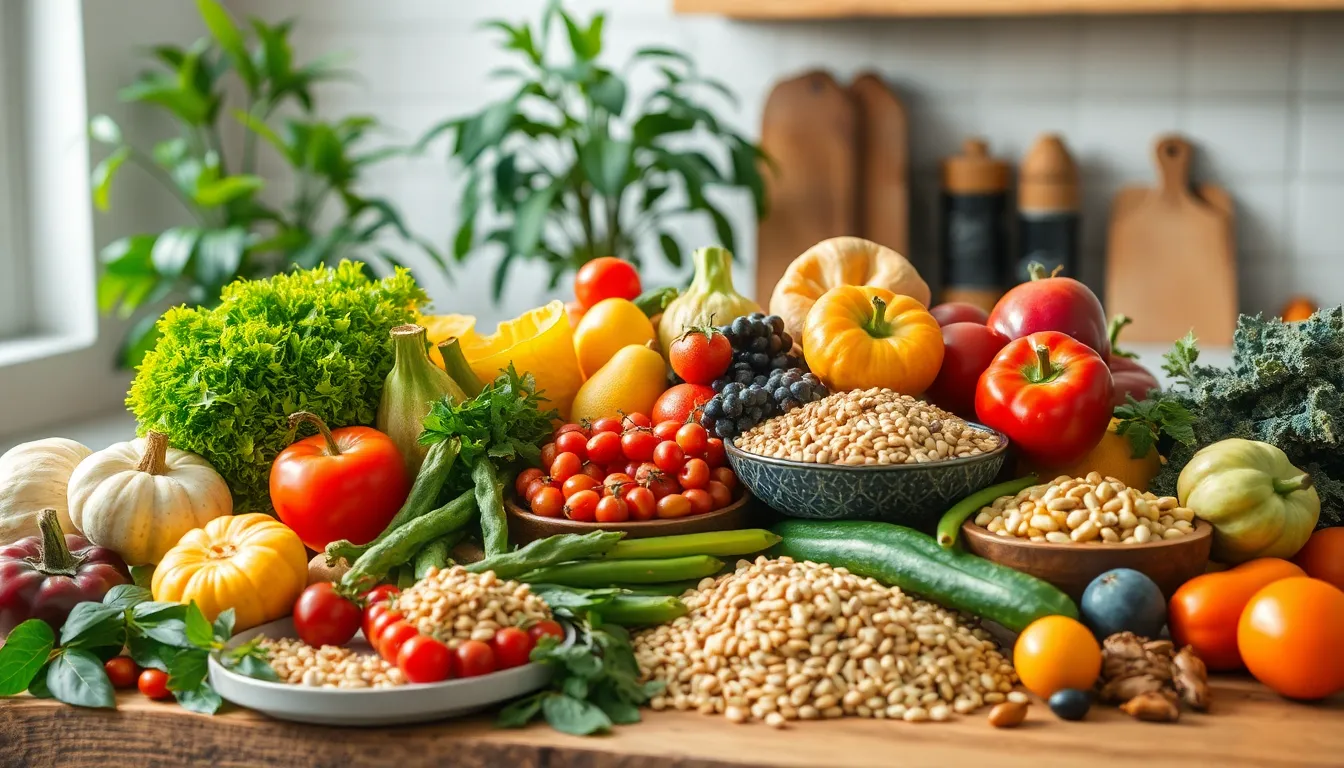Adopting a vegan lifestyle can feel like diving into a pool of kale—refreshing yet a little daunting. But fear not! Embracing plant-based living isn’t just about saying goodbye to bacon; it’s about welcoming a world of delicious flavors and vibrant health. With the right tips and tricks, anyone can navigate this green journey without missing out on their favorite foods.
Table of Contents
ToggleUnderstanding Veganism
Veganism involves more than just eliminating animal products from one’s diet. It embraces a holistic approach to living, emphasizing ethical treatment of animals and sustainability.
Definition of a Vegan Lifestyle
A vegan lifestyle excludes all animal-derived products, including meat, dairy, and eggs. Many individuals adopt this lifestyle to align their eating habits with their ethical beliefs. Furthermore, a vegan lifestyle extends beyond food choices to encompass clothing, cosmetics, and household products. This commitment often reflects values of compassion and environmental stewardship.
Benefits of Going Vegan
Health benefits abound for those who choose a vegan diet. Research indicates that vegans may experience lower risks of chronic diseases, such as heart disease and diabetes. Weight management often improves as well. Vegan diets are generally rich in fruits, vegetables, whole grains, and legumes, providing essential nutrients. Additionally, embracing veganism contributes to a more sustainable planet by reducing carbon footprints and conserving water resources.
Dietary Tips for Vegans

Transitioning to a vegan lifestyle involves more than removing animal products from meals. It’s crucial to focus on getting the necessary nutrients that support health and well-being.
Essential Nutrients to Consider
Vegans should pay attention to several key nutrients. Protein sources include legumes, tofu, and tempeh, which provide essential amino acids. Vitamin B12 poses a challenge since it’s primarily found in animal products. Using fortified foods or supplements can prevent deficiency. Iron is vital for energy; dark leafy greens, lentils, and chickpeas offer excellent plant-based options. Nutritional yeast adds flavor while supplying B12, protein, and other vitamins. Omega-3 fatty acids, found in flaxseeds and chia seeds, support heart health. Calcium from fortified dairy alternatives and leafy greens contributes to bone strength. Lastly, it’s wise to monitor vitamin D levels, especially in areas with limited sunlight.
Meal Planning and Prepping
Meal planning makes adhering to a vegan diet simpler and enjoyable. Start with creating a weekly menu that emphasizes diverse ingredients and flavors. Ingredients like whole grains, fruits, and vegetables serve as staples. Preparing meals in advance helps maintain focus on healthful choices throughout the week. Batch-cooking beans, grains, and sauces can save time. Keep some grab-and-go snacks, such as nuts or energy bars, for busy days. Utilizing apps or websites for vegan meal prep ideas can inspire creativity. Lastly, investing in quality containers makes storing and reheating meals more convenient.
Vegan Shopping Guide
Shopping for vegan products requires awareness and skill. This guide provides essential tips to navigate vegan choices effectively.
Finding Vegan Products
Identify vegan options by seeking dedicated sections in grocery stores that focus on plant-based items. Explore local health food stores or online retailers that specialize in vegan products. Look for brands that prioritize transparency in sourcing and production. Researching community-supported agriculture programs enhances access to fresh, local produce. Opt for seasonal fruits, vegetables, and grains, which often come without packaging and are organic. Support businesses that emphasize sustainable practices, as they align with vegan values. Engage with vegan communities for recommendations on products and shops, as this fosters a sense of connection and support.
Reading Labels Effectively
Reading labels is crucial to ensure products meet vegan standards. Look for clear statements like “100% vegan” or “no animal ingredients” on packaging. Ingredient lists should not contain items like dairy, eggs, or honey. Familiarize with common non-vegan ingredients such as casein, gelatin, and lanolin. Check for certifications from organizations committed to vegan ethics, as this provides additional assurance. Pay attention to allergens, as some vegan products may still contain gluten or nuts. Utilize smartphone apps that scan barcodes and provide instant vegan information for convenience while shopping.
Sustainable Vegan Practices
Sustainable vegan practices enhance the commitment to a plant-based lifestyle. Adopting these methods not only supports personal health but also contributes positively to the environment.
Reducing Waste in a Vegan Lifestyle
Minimizing waste becomes essential in a vegan lifestyle. Choosing biodegradable or reusable products reduces trash production significantly. Incorporating composting practices for food scraps enriches soil and decreases landfill contributions. Shopping in bulk diminishes packaging waste and promotes cost-efficiency. Additionally, saving food leftovers encourages creativity in meal preparation and reduces overall food waste.
Supporting Ethical Brands
Aligning with ethical brands strengthens the impact of a vegan lifestyle. Selecting companies that prioritize sustainability reflects a commitment to environmental stewardship. Researching brands that use eco-friendly materials and transparent sourcing promotes responsible consumption. Supporting local businesses helps foster community growth and reduces carbon footprints associated with shipping. Lastly, endorsing cruelty-free products underscores the ethical treatment of animals in the marketplace.
Socializing as a Vegan
Social situations can present unique challenges for those embracing a vegan lifestyle. It’s possible to enjoy these occasions with a little preparation and awareness.
Navigating Restaurants and Dining Out
When dining out, research restaurants ahead of time. Look for places with vegan-friendly menus or those known for accommodating dietary preferences. Asking for modifications to existing dishes can enhance options. Bringing along a list of favorite plant-based dishes may also help communicate preferences to servers. When unsure of ingredients, don’t hesitate to inquire about specific items. Alternatives, such as salads with no cheese or vegetable-based pasta, often offer satisfying choices.
Communicating Your Vegan Choices
Expressing dietary needs to friends and family fosters understanding and respect. Sharing the reasons for choosing veganism can encourage dialogue and curiosity. Many people appreciate knowing how this lifestyle aligns with health and ethical considerations. When attending gatherings, suggest hosting or providing a vegan dish to share, ensuring tasty options for everyone. Offering to educate others can transform perceptions and encourage inclusivity. Always remain patient and open-minded in conversations, allowing for a positive exchange of ideas.
Embracing a vegan lifestyle opens the door to a world of flavors and health benefits. By focusing on plant-based foods and sustainable practices, individuals can make choices that not only nourish their bodies but also support the planet. The journey may come with challenges, but with the right tips and resources, it can be a fulfilling experience.
It’s essential to stay informed about nutrition and to explore various vegan options available. Building a supportive community and sharing experiences can enhance the transition, making it more enjoyable. Ultimately, a commitment to veganism reflects a dedication to personal well-being and ethical living, paving the way for a healthier future for all.




